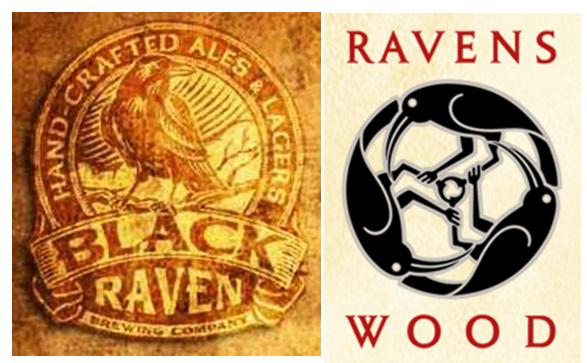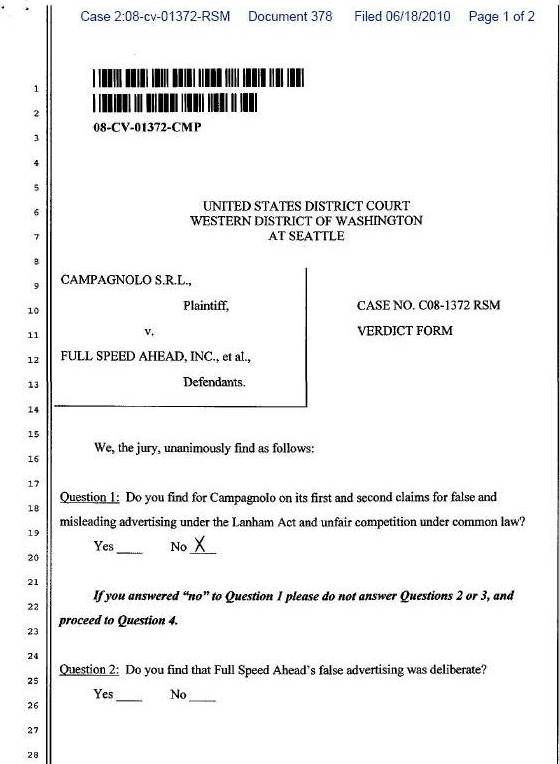Entries from June 1, 2010 - June 30, 2010
Shingle Manufacturer Obtains Permanent Injunction, with Compliance Options
In CertainTeed Corp. v. Seattle Roof Brokers, a manufacturer of asphalt shingles filed suit against James Garcia, a “roof broker” who allegedly made false statements about CertainTeed’s roofing products.
On June 28, Western District Judge Richard Jones granted summary judgment for CertainTeed on its false advertising and Consumer Protection/Unfair Business Practices Act claims, and imposed a permanent injunction.
In doing so, the court found Mr. Garcia’s falsehoods included statements that CertainTeed’s product “will not be able to pass a resale inspection after 15 to 20 years”; that “one roofing contractor reports submitting over 600 warranty claims to CertainTeed within the last four years”; and CertainTeed’s product “have a history of premature failure.”
Gotta love a court that gives its parties options.
In its permanent injunction, the court stated: “As to Mr. Garcia’s website (whether at www.seattleroofbrokers.com or any other domain he controls), he has two options. He may, at the top of every page on his website, include a prominent hyperlink (of a font size at least as large as any other font used on the page) to an electronic version of this order. The text of the hyperlink shall include the following statement: ‘Please click here for court order finding that this website contains false statements.’ His website must continue to include these hyperlinks until he removes every false statement that violates this order, at which time he can notify the court that the false statements have been removed. If the court finds that the false statements have been removed, it will permit him to remove the hyperlinks. Alternatively, Mr. Garcia may take his website ‘offline,’ remove the false statements, submit the new website content to the court for approval, and await court approval before placing his website online.”
The case cite is CertainTeed Corp. v. Seattle Roof Brokers, No. 09-563 (W.D. Wash. June 28, 2010) (Jones, J.).
Ninth Circuit Finds Use of Ordinary Word in Trademark Still Can Dilute
“She sells sea shells by the sea shore. That’s swell, but how about Shell espresso, Tide motor oil, Apple bicycles and Playboy computers? We consider the application of anti-dilution law to trademarks that are also common English words.”
One guess which Ninth Circuit judge wrote the this opinion?
Judge Alex Kozinski is a great writer. He wrote the opinion in Visa Int’l Service Association v. JSL Corp., which the court handed down on June 28.
The case considered whether the mark EVISA, which evolved from ELKAIWA VISA, for an Internet language school dilutes the credit card processing association’s famous VISA trademark. “Elkaiwa” is Japanese for English conversation, which when paired with “visa” is meant to suggest the ability to travel through the English-speaking world.
The District of Nevada granted summary judgment for Visa International, enjoining JSL Corp.’s use of the mark on the ground it was likely to cause dilution.
JSL appealed, arguing its EVISA cannot cause dilution because visa is a travel document authorizing the bearer to enter a country’s territory. The Ninth Circuit noted that “When a trademark is also a word with a dictionary definition, it may be difficult to show that the trademark holder’s use of the word is sufficiently distinctive to deserve anti-dilution protection because such a word is likely to be descriptive or suggestive of an essential attribute of the trademarked good.”
The court seemed to sympathize with JSL Corp.’s position, but found that its use of “visa” as a trademark despite its ordinary meaning is still likely to dilute Visa International’s famous mark.
“It’s true that the word visa is used countless times every day for its common English definition, but the prevalence of such non-trademark use does not undermine the uniqueness of Visa as a trademark. ‘The significant factor is not whether the word itself is common, but whether the way the word is used in a particular context is unique enough to warrant trademark protection.’ In the context of anti-dilution law, the ‘particular context’ that matters is use of the word in commerce to identify a good or service. There are, for instance, many camels, but just one Camel; many tides, but just one Tide. Camel cupcakes and Tide calculators would dilute the value of those marks. Likewise, despite widespread use of the word visa for its common English meaning, the introduction of the eVisa mark to the marketplace means that there are now two products, and not just one, competing for association with that word. This is the quintessential harm addressed by anti-dilution law.”
The case cite is Visa Int’l Serv. Assoc v. JSL Corp., __ F.3d __, 2010 WL 2559003, No. 08-15206 (9th Cir. June 28, 2010).
A Brand Symbolizes a Seller's Credibility
The lead into this article in today’s Oregonian captures the value of a trademark.
“Customers swore the credibility of G.I. Joe’s name was the reason they shopped at the longtime sporting goods retailer and when it was changed, the reason they stopped.
“That name — and the ideals and spirit it represented — was at the heart of efforts earlier this year by four former G.I. Joe’s executives to bring back the bankrupt and liquidated chain.”
The story goes on to talk about how a recent trademark infringement lawsuit sidetracked an effort to resurrect the bankrupt sporting goods store’s brand.
Good story, but for me what’s neat is the media’s recognition that a brand is what consumers value. It’s the reason why they make repeat purchases. It’s why consumers are loyal.
It’s also cool how brands work. Companies want to reap the benefits of customer loyalty. That motivates them to maintain the value of goods sold under the brand. Everybody wins.
Trademark Law 101, sure, but it’s still pretty cool.
Redmond's Black Raven Brewing Company Loses TTAB Fight with Winery
 BeauxKat’s (left) and Franciscan’s raven logos
BeauxKat’s (left) and Franciscan’s raven logos
Redmond, Wash.’s BeauxKat Enterprises, LLC, filed an intent-to-use application to register BLACK RAVEN BREWING COMPANY as a trademark with the Patent and Trademark Office for beer with “brewing” and “company” disclaimed.
Franciscan Vineyards, Inc., opposed on an alleged likelihood of confusion with its prior registrations for RAVENSWOOD, RAVENS WOOD, RAVENS, RAGIN’ RAVEN, and a stylized raven bird design for wine, clothing, and sauces.
On June 21, the Trademark Trial and Appeal Board sustained the opposition.
“We find that the du Pont factors, on balance, weigh in favor of a finding of likelihood of confusion. We conclude that consumers familiar with opposer’s wine sold under the mark RAVENS, would be likely to believe, upon encountering applicant’s mark BLACK RAVEN BREWING COMPANY for beer, that the goods originate from or are associated with or sponsored by the same entity.”
The Seattle-based Brewery Log Blog calls the decision “somewhat of a travesty,” noting the TTAB continues to lump beer and wine together, which could cause problems for both industries.
“This country has a glut of wine and beer producers,” it argues. “Many have extremely similar names (i.e. Stone Cellars v. Stone Brewing; Fat Cat Beer v. Red Cat Wine; Sea Dog, Laughing Dog, Lazy Dog, Spotted Dog and [a] whole mess of other dog breweries and wineries). This could open the floodgates for more challenges in between these two industries.”
Well, I wouldn’t say floodgates, and I question the precedential value of the decision, but TBLB’s point is well taken. And props for watching the TTAB!
The case cite is Franciscan Vineyards, Inc. v. BeauxKat Enterprises, LLC, Opposition No. 91181755 (TTAB June 21, 2010).
Jury Finds for Defendant in Bicycle Component False Advertising Case

The jury’s in.
On June 18, the Western District jury in the Campagnolo S.R.L. v. Full Speed Ahead false advertising case found for the defendant.
Campagnolo had claimed the Seattle-based maker of bicycle components made false representations about the stiffness-to-weight ratios of the parties’ bicycle cranksets. (See most recent STL’s post about the case here.)
The jury unanimously found that Campagnolo failed to establish its claims for false advertising, common law unfair competition, or violation of the Washington Consumer Protection/Unfair Business Practices Act, awarding the plaintiff nothing.
The case cite is Campagnolo S.R.L v. Full Speed Ahead, Inc., No. 08-1372 (W.D. Wash. June 18, 2010).
